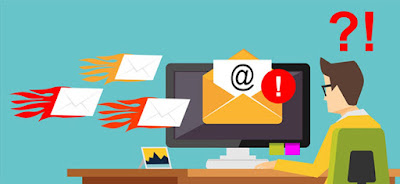WHAT IS EMAIL BOMBARDMENT?


Cybercrime translates into crimes committed through computers over the internet. They consist mainly of the illegal use of computer equipment to promote practices such as child pornography or the theft of personal information, one of the problems that most worries most users of 'the cloud'.
The ultimate goal of cybercriminals is often to
appropriate without prior consent access to information and data from others:
they are often owned by people, companies or governments. These attacks are
usually carried out over the internet.
Cybercrime is, therefore, one of the evils that lurks in
the technological age. It is, therefore, avoidable if you take some precautions
when browsing the Internet and keeping your device safe with good antivirus software.
Those who try to steal personal documents, and even state
documents, are looking for a way to create computer programs or viruses that
allow them to steal the keys or passwords of users and thus get something in
return: whether they are privileged information or financial gain.
Last month, some cybersecurity companies issued an alert
warning that hackers break into private accounts and steal all kinds of
personal data.
One of the most important points to keep in mind to avoid
so-called cyber-attacks is to use strong passwords. It is a point to take into
account since if someone manages to hack, for example, your email, they can
have access to information on websites where you have a user account and even
make purchases in your name paid for by you.
Rules
to choose to protect your data in an ideal way
Ø Do
not save unencrypted passwords on the computer's hard drive, or leave them
written in places that can be seen by other people.
Ø Try
not to enter them in public computers such as those in an internet café or a
hotel.
Ø Passwords
must never be sent by email, much less respond to an email from the person
requesting them.
Ø The
security question that allows you to recover or change the password must be
answered with a piece of information that only you know, since with the arrival
and expansion of the use of social networks, cybercriminals can know a lot of
our information almost without realizing it.
Ø Changing
your password frequently is a factor that can make your password more secure.
Therefore, it is recommended not to keep it for more than thirty days.
Ø It
is recommended that the password is not made up of words that appear as is in
the dictionary and therefore, the more complex and unknown they are, the
better.
Ø For
each website you have to choose a different password, in such a way that if,
unfortunately, someone accesses one of our passwords, they will not be able to
have all our information.
Ø Have
a good quality antivirus
that can keep your device protected from all types of unwanted hacking and
spying.
Protection
against spoofing attacks
It is important that you protect yourself against
spoofing attacks. It must be borne in mind that impostors usually send e-mails
in which they pose as banks that ask you to indicate your access data.
- These data must not be provided, either by phone or
email. Banks will never request this information and if they have to, they will
do so in person.
- Before entering any confidential data on the Internet,
it must be verified that the address is secure.
- The web, in addition, must have a valid certificate, to
do this, click on the symbol that is before the Internet address. To prove it,
they show a padlock as a symbol or the website logo.
- If you have entered your data on a dubious site due to
confusion, or excessive confidence, it is convenient that you contact your bank
immediately and if necessary, block the PIN and TAN codes.
Comments
Post a Comment